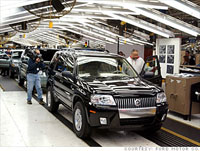German Government, Unions Angry at General Motors. Opel workers plan protests
General Motors Co.'s decision to scrap the sale of European subsidiary Opel raised new uncertainty Wednesday over the unit's future, astonishing politicians in Germany and Russia, and prompting workers to plan walkouts in protest.

The GM board's unexpected decision to call off the sale to auto parts maker Magna International Inc. and Russian lender Sberbank was a startling end to months of haggling in which Chancellor Angela Merkel and other German leaders had strongly backed the deal.
Now German workers worry GM will make even more cuts to return Opel to profit than Magna would have. Still, the decision won a cautious welcome from union officials in Britain and Poland, where workers had feared possible cutbacks in a Magna takeover, The Associated Press reports.
The board’s Nov. 3 vote to keep Opel helps GM protect small-car technology used in models sold around the world. The biggest U.S. automaker also is seeking to portray itself as a changed company after exiting a six-week bankruptcy in July with a new board and streamlined executive corps.
"Now they need to demonstrate they are fundamentally different and take an underperforming unit and turn it into a strong performer," said Dennis DesRosiers, president of DesRosiers Automotive Consultants Inc. in Richmond Hill, Ontario.
GM management went into the meeting in Detroit expecting the board, which includes Chief Executive Officer Fritz Henderson, to ratify selling most of Opel to Aurora, Ontario- based Magna and Russian lender OAO Sberbank, people familiar with the deal said. Executives had to rush to tell Magna officials and European governments of the move, the people said, Bloomberg reports.
According to Forbes, employees of General Motors Co.'s unit Opel are planning protests and work stoppages at four German factories against the decision to abandon the sale of the automaker.
Subscribe to Pravda.Ru Telegram channel, Facebook, RSS!





